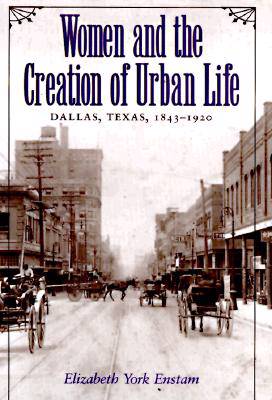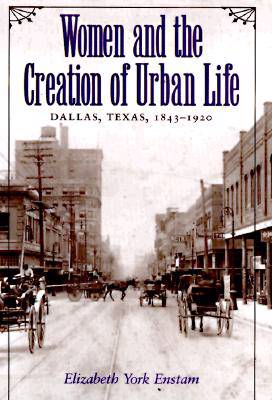
- Retrait gratuit dans votre magasin Club
- 7.000.000 titres dans notre catalogue
- Payer en toute sécurité
- Toujours un magasin près de chez vous
- Retrait gratuit dans votre magasin Club
- 7.000.000 titres dans notre catalogue
- Payer en toute sécurité
- Toujours un magasin près de chez vous
Women and the Creation of Urban Life
Dallas, Texas, 1843-1920
Elizabeth York Enstam
Livre relié | Anglais | Centennial Series of the Association of Former Students Texas A & M University (Hardcover) | n° 72
67,95 €
+ 135 points
Description
Throughout the history of Dallas, women have worked both alongside and apart from the men now remembered as the city's founders and builders. In truth, women helped to create the definitive forms of urban life by establishing organizations and agencies that altered the responsibilities and functions of local government, amended the public conception of political issues, changed the city's physical structure, and affected the day-to-day lives of thousands of people. In Women and the Creation of Urban Life, Elizabeth York Enstam examines how women stretched, redefined, and at times erased the essentially artificial boundaries between female and male, between "the private" and "the public" as aspects of human endeavor. As Dallas evolved from a frontier town into a modern city, the varied facets of women's work revealed how their roles changed to shape, influence, and on occasion determine specific characteristics of urban life during times when female lives were supposed to be only private. The years after 1880, especially, opened a period of enormous change in women's roles in public life and in women's status in American society. Enstam traces the ways national trends were expressed at the local level and analyzes women's accomplishments and the importance of their work as they assumed community leadership in perpetuating the traditions, education, fine arts, and customs of the larger culture, and in implementing Progressive principles in a specific community. Enstam's contribution fills a void by examining women's lives and women's work within a changing urban context. Urban historians, scholars of women's studies, historians of women, and readers with a general interest in history will find that the significance of these women's accomplishments in Dallas have echoed throughout the nation.
Spécifications
Parties prenantes
- Auteur(s) :
- Editeur:
Contenu
- Nombre de pages :
- 284
- Langue:
- Anglais
- Collection :
- Tome:
- n° 72
Caractéristiques
- EAN:
- 9780890967997
- Date de parution :
- 01-03-98
- Format:
- Livre relié
- Format numérique:
- Genaaid
- Dimensions :
- 164 mm x 243 mm
- Poids :
- 743 g







